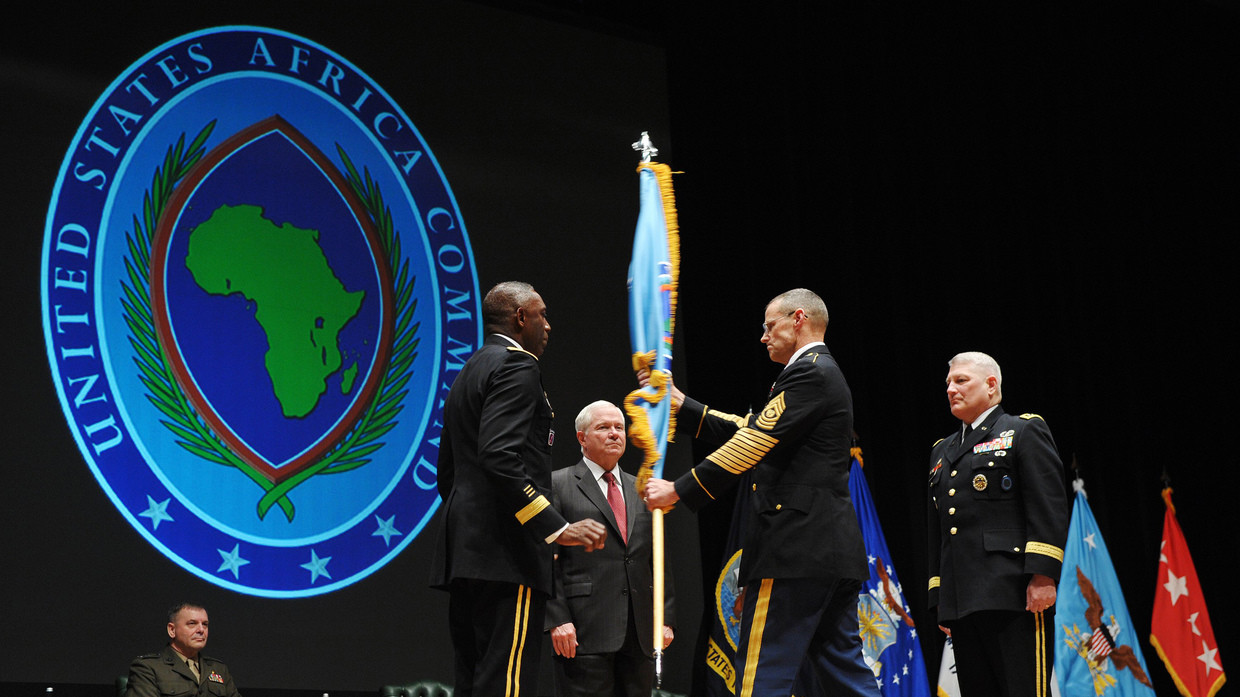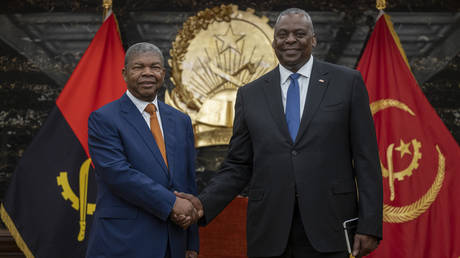Justified Accord 2024, the US Africa Command’s (AFRICOM) largest ever exercise in East Africa, ran from February 26 to March 7 and was hosted in Kenya, Djibouti and Rwanda. Joint Africa-US war games have been held for years and are portrayed as crucial to the security and stability of the continent.
They are also presented as integral to addressing terrorism and other transnational crimes in Africa and beyond. Through these exercises, the US seeks to improve the capacity of Africa’s militaries. Terrorism and other forms of extremism have been on the global agenda for decades and attracted unprecedented attention after the 9/11 attacks.
Violent extremism and counterterrorism were seen as the foremost national security issue under both presidents George W. Bush and Barack Obama, and it was also an issue of concern under the Clinton administration.
The US military presence in Africa, however, is led by its national security objectives as well as its geopolitical interests. Africa’s security is part of broader US security concerns across the globe. Russia’s upswing in Africa’s security matrix – especially in the West African subregion, the Central African Republic, Libya, the Sahel – has placed the US on tenterhooks. Moreover, China’s footprint in Africa, primarily in infrastructure development and security, has also drawn the attention of Washington and enhanced the significance of the Africa-US military partnerships.
In his testimony before the Senate Armed Services Committee on March 7, 2024, the head of USAFRICOM, General Michael Langley, expressed concern about the upsurge in the influence of Russia and China in Africa. “Recent history shows that Moscow and Beijing jump to fill the void when American engagement wanes or disappears, and we cannot afford to do that in West Africa,” he said. Therefore, clearly, part of the AFRICOM’s mission is to stave off Russian and Chinese encroachment in Africa.
The US, since the end of the bipolar world, has had an almost unassailable ideological dominance in Africa and a disproportionate role in Africa’s security. Within the same period, however, China has been on the ascendancy as a formidable global actor. Russia has also upped its interest in Africa’s security.
To deal with this, the US has tried to redefine its relations with Africa from paternalism to partnership, and invariably cautions Africa against Russia and China. The US claims that, unlike China and Russia, it is motivated by Africa’s wellbeing, investing in civilian and defense institutions. Ironically, the US also claims that it upholds Africa’s sovereignty, unlike China, which extends predatory loans to impoverished African countries and exploits their natural resources in return. The US, also accusing Russia of trading in Africa’s natural resources under the guise of providing security, does not mention that Africa’s relations with the US and the West generally are just as problematic. The scramble for Africa’s natural resources and the consequent hollowing out of its sovereignty is a Western design formalized at the Berlin Conference.
General Langley drew a dichotomy between the US and its rivals in his presentation before the Senate Armed Services Committee. “Chinese and Russian companies have used predatory tactics to entangle African states in debt and extractive contracts that leave local populations in the lurch. America offers an alternative. US diplomatic, development, and defense support does not hold their peoples and natural resources hostage, so we do not impose a moral balancing act on our partners. Instead of demanding financial and political concessions, we demand accountability on the fundamentals: respect for human rights and the rule of law,” he claimed.
This dichotomy is false. The US invokes the rule of law expediently. Since the Cold War period, for instance, Washington has had relations with autocrats in Africa and supported the overthrow of leaders opposed to its policies. The US and its Western allies are complicit in atrocities in Gaza, which renders their self-arrogated role as custodians of international law and norms hollow.
The Africa-US joint military exercises in East Africa come in two phases. First is the ‘Justified Accord’ for medical, communication, or logistical training. Second, the “Cutlass Express exercises” are for maritime security enforcement and promotion of national and regional security in East Africa.
The first phase is hosted by the Kenya Defense Forces and usually takes place from a British military base in Nanyuki, Kenya. It is to be remembered that the British soldiers from this base have over the years been implicated in atrocities such as murder in the surrounding communities.
In East Africa, USAFRICOM prides itself on “deep commitment to peacekeeping, crisis response and fostering enduring partnerships with military forces in the region.” Around 1,000 personnel from more than 20 countries from the East African region participate in these joint training exercises, which prepare them for African Union (AU), and United Nations (UN) mandated missions.
Usually between 2,000 and 2,500 short-term rotational US military and civilian personnel make up the Combined Joint Taskforce Horn of Africa (CJTF-HOA), which covers an expansive region that entails the land and airspace in Djibouti, Ethiopia, Eritrea, Kenya, Seychelles, Somalia, and Sudan, as well as coastal waters of the Red Sea, the Gulf of Aden, and the Indian Ocean. With the challenges minimized, this partnership is glowingly portrayed: “Through collaborative training and shared experiences, the exercises foster a strong professional ethos and partner military forces, enhancing their ability to respond effectively to crises and contribute to lasting peace in East Africa.”
Concerned about its national security, the US monitors “ungoverned spaces” in Africa that are open to transnational crimes such as terrorism, as well as drug and human trafficking. The US military’s exploits and its interest in Africa’s security are self-serving. An unstable Africa would be a haven for transnational crimes that could easily find their way onto the US shores. Thus, the US regards the expansive yet ungoverned waters of the Gulf of Guinea, the Gulf of Aden, and the West Indian Ocean as susceptible to illegal fishing, illegal trafficking, and piracy which necessitates its interest in maritime security.
Further, the US military trains Africa’s security forces in counterterrorism and other areas of military professionalization, advises on peace operations, and oversees humanitarian assistance efforts. The US military has worked with the African Union Mission in Somalia (AMISOM) for medical supplies in Mogadishu and humanitarian assistance to Ethiopia and northern Kenya. USAFRICOM is also working with the AMISOM’s successor, the African Union Transition Mission in Somalia (ATMIS).
The counterterrorism or the “War on Terror” discourse, however, usually glosses over questions related the Manifest Destiny ideology, poverty, inequalities, and injustice exacerbated by deeply flawed institutions of global governance, institutionalized international predation, and interference in the sovereignty of states in Africa. Instead, a highly reductive and flawed position that terrorism is a manifestation of a clash of civilizations and can be addressed militarily holds sway.
African states are institutionally weak, weighed down by corruption and poor governance, and lack command and control which expose them to the smuggling of drugs, people and weapons, as well as the dumping of hazardous wastes. These challenges have a historical and international dimension, it must be affirmed. The persistence of neocolonial patterns within a deeply unequal international order has contributed immensely to Africa’s inability to assert itself. The West has callously dumped hazardous wastes in Africa, for instance in Kenya, that have been linked to an upsurge in cancer.
The Africa-US military pacts are not altruistic. Embedded in their design are America’s foreign policy and strategic interests. Consequently, there has been a backlash over the presence of US military in Africa. In Niger, for instance, the military authorities have revoked its longstanding military partnership with the US and ordered them to close down their two military bases in Niamey. The US airbase in Agadez, Niger is one of its largest drone bases in Africa for intelligence, surveillance and reconnaissance activities. From this base, the US conducts drone attacks across the world. The collapse of the US-Niger military cooperation, the West fears, will witness a resurgence of terrorism-related activities in the Sahel since Niger has been a bulwark against violent extremism in the region. The US has stated, however, that discussions are ongoing with Niger on the status of its military bases.
The West is wary that Russia’s Africa Corps, formerly Wagner, will increasingly become a major player in the security in the Sahel, though is not about who has the capacity to reinforce national efforts towards combating terrorism in the Sahel. It is ideological warfare. It is also about sovereignty. In the wake of military coups in Burkina Faso, Niger, Guinea and Mali, the assertive authorities have closed down French bases. They have become impatient with decades of economic, political, cultural, military chokehold under the exploitative Francophonie orbit. They are deliberate about ending paternalistic and neo-colonial relations with France, their former colonizer, and other Western powers. Not to be left exposed, however, they are exploring and have indeed established alternative economic, political and military relations with Russia, China, Iran and other emerging powers.
In Niger, the decision to revoke military ties with the US was endorsed by trade unions. The inference is that the Nigerien civil society is in concurrence with the military establishment on the need to free Niger from condescending and exploitative partnerships. The mass support for military takeovers in the Sahel and West Africa was evidence of the backlash against puppet governments out of touch with the people.
The toppled regimes were seen as bending over backwards to accommodate foreign policies, beneficial to foreign actors especially France, but pernicious to the people’s wellbeing. Owing to hostility against Western military bases, the USAFRICOM has struggled to establish its headquarters in Africa, and African countries are reluctant to host its headquarters lest they are perceived as US lackeys. Exceptions are countries such as Djibouti which hosts several foreign military bases by major global actors and Kenya which hosts British and US forces. USAFRICOM headquarters is located in Stuttgart, Germany, and is unlikely to move to Africa any time soon.
The justification for the presence of the US military in Africa is that African militaries are just as weak as the state in Africa. Hence, they lack command and control, training, equipment, and logistics capabilities to assert their sovereignty. Furthermore, they consistently exhibit little or no capacity to secure their people, and effectively participate in peacekeeping operations in Africa’s troubled spots without external assistance. However, with an increasingly multipolar world that affords Africa alternative strategic partners, the influence of the Africa-US military pacts is likely to wane as China and Russia and other emerging powers assert themselves.
The statements, views and opinions expressed in this column are solely those of the author and do not necessarily represent those of RT.


